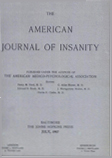FORENSIC ISSUES IN THE NEUROSES OF WAR
Abstract
The major forensic issues are created by the most common emotional casualty of war, the traumatic neuroses. No economical orientation on these issues can be made without a workable conception of the psychopathology. This neurosis hits hard at a certain aspect of the personality, namely the highly coordinated psycho-physical apparatus for action, which becomes contracted in scope of effectiveness or inhibited. The patient does not give up striving, but all his new attempts are based on his now shrunken resources.
The issues of public interest are the reduced capacity for work, the issue of compensation, and the prophylaxis and treatment of these conditions. Plans for treatment must be drawn on the known characteristics of the neurosis. It is a benign condition in a large proportion of cases if treated early; if it is permitted to consolidate it becomes intractable. Therefore all effort should be made to prevent the neurosis from hardening in its early stages. Since the results of hasty treatment in the last war led to such poor results, new researches must be conducted.
Diagnostic criteria are definite and precise. No malingerer can simulate all of them, especially if checked by Rorschach test.
Incapacity for work and quest for compensation are consequences of reduced resources of the subject. Vocational retraining is based on a faulty conception of the disease.
Compensation should be reserved only for cases who prove therapeutic failures after two years of constant application.
The pathology and treatment of this neurosis is not a settled matter. A concerted effort on the part of all psychiatry is imperative to make the established facts about it generally known and to gather new facts. Research staffs and teaching staffs for those who will encounter early cases are imperative.
Access content
To read the fulltext, please use one of the options below to sign in or purchase access.- Personal login
- Institutional Login
- Sign in via OpenAthens
- Register for access
-
Please login/register if you wish to pair your device and check access availability.
Not a subscriber?
PsychiatryOnline subscription options offer access to the DSM-5 library, books, journals, CME, and patient resources. This all-in-one virtual library provides psychiatrists and mental health professionals with key resources for diagnosis, treatment, research, and professional development.
Need more help? PsychiatryOnline Customer Service may be reached by emailing [email protected] or by calling 800-368-5777 (in the U.S.) or 703-907-7322 (outside the U.S.).



